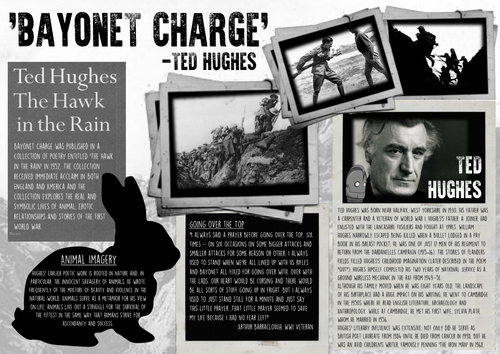










Taught over a series of 4 one hour lessons to a very able year 10 class with the focus on autonomy and stretch and challenge. Taught as part of the AQA GCSE Power and Conflict Cluster 2015.
Lesson 1: To understand the relationship between Bayonet Charge and it’s context
Lesson requires students to get a solid command of the context surrounding the poem and this includes both influences on Hughes and the idea of going over the top. After teaching this and speaking to students, all said that taking the time to explore the context helps them empathise with the story and think more openly - not to mention it is an AQA AO.
Resources provided: videos, notes below each slide for direction
Lesson 2: To be able to discuss Bayonet Charge’s form and structure
This lesson will promote the analysis of Hughes' structure and form as well as promoting student autonomy in their approach to analysing poetry
Resources provided: blank form/structure grid, completed form/structure grid for teacher guidance, helpline prompts for struggling students
Lesson 3: To analyse Hughes’ use of language
Round-robin style activity analysing stanzas to encourage students to essentially teach the poem to one another
Resources provided: Key word starter activity, postcard exit
Lesson 4: To analyse Hughes’ use of language and to be able to write about it effectively
Focused on independent writing, show students how to write basic plans (around 6 minutes) and then extended writing (30 minutes) - this took my students longer so we didn't manage to peer assess, but a peer assessment outline is provided. Homework task included.
Bundle Includes:
* Ted Hughes socio-historical context sheet
* Links to numerous videos (as videos can't be uploaded)
* Form and structure grids (blank for students, completed for teacher)
* Form and structure prompts to aid weaker students
* Images for spider diagrams
* Grade 9 vocabulary meant to stretch the very able
* Starter tasks
* Postcard exit plenary
* Peer assessment Grids
* Annotated copy of the poem
Lesson 1: To understand the relationship between Bayonet Charge and it’s context
Lesson requires students to get a solid command of the context surrounding the poem and this includes both influences on Hughes and the idea of going over the top. After teaching this and speaking to students, all said that taking the time to explore the context helps them empathise with the story and think more openly - not to mention it is an AQA AO.
Resources provided: videos, notes below each slide for direction
Lesson 2: To be able to discuss Bayonet Charge’s form and structure
This lesson will promote the analysis of Hughes' structure and form as well as promoting student autonomy in their approach to analysing poetry
Resources provided: blank form/structure grid, completed form/structure grid for teacher guidance, helpline prompts for struggling students
Lesson 3: To analyse Hughes’ use of language
Round-robin style activity analysing stanzas to encourage students to essentially teach the poem to one another
Resources provided: Key word starter activity, postcard exit
Lesson 4: To analyse Hughes’ use of language and to be able to write about it effectively
Focused on independent writing, show students how to write basic plans (around 6 minutes) and then extended writing (30 minutes) - this took my students longer so we didn't manage to peer assess, but a peer assessment outline is provided. Homework task included.
Bundle Includes:
* Ted Hughes socio-historical context sheet
* Links to numerous videos (as videos can't be uploaded)
* Form and structure grids (blank for students, completed for teacher)
* Form and structure prompts to aid weaker students
* Images for spider diagrams
* Grade 9 vocabulary meant to stretch the very able
* Starter tasks
* Postcard exit plenary
* Peer assessment Grids
* Annotated copy of the poem
Something went wrong, please try again later.
This resource hasn't been reviewed yet
To ensure quality for our reviews, only customers who have purchased this resource can review it
Report this resourceto let us know if it violates our terms and conditions.
Our customer service team will review your report and will be in touch.
£4.00
